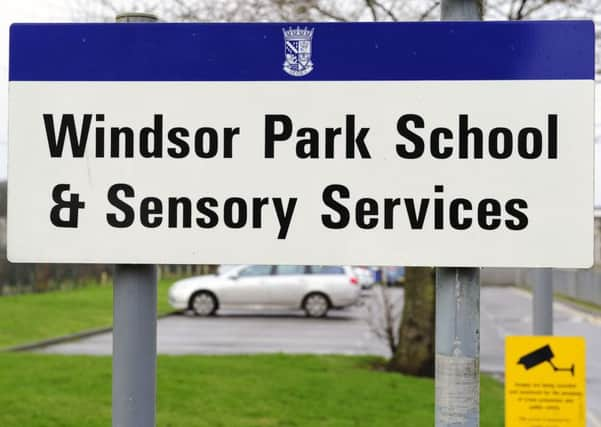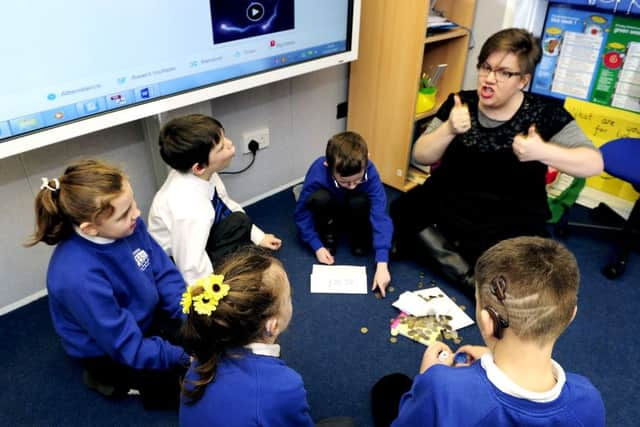Small school a big success for Falkirk


The purpose built facility for the deaf which supports over 300 sensory impaired children across the district has won praise – and awards – for its dedicated approach to helping them from nursery through primary to secondary education.
Sharing a campus with Bantaskin Primary and Falkirk High, Windsor Park School and Sensory Service, one of only four schools for the deaf in Scotland, follows a planned Curriculum for Excellence delivered through ‘total communication’ using speech, audition, lip reading and sign supported English and British Sign Language to help the youngsters develop skills for learning including literacy and numeracy, life and work and health and wellbeing in and out of the classroom.
Advertisement
Hide AdAdvertisement
Hide AdThey also benefit from their additional support needs being identified and addressed by a variety of specialist services.


The school works closely with speech and language therapists, audiologists and other agencies to ensure the best for its hearing impaired pupils.
Sign language tutor, Alan Sanders, a member of the staff for 16 years, provides classes for all associated staff, families and pupils. He also teaches sign and finger spelling to hearing children and parents as part of the school’s forward thinking inclusion policy to promote communication and understanding of the challenges the deaf community face.
Head teacher Catherine Finestone quit mainstream teaching after three years to enrol at Moray House College in Edinburgh in 1975 to train to teach the deaf.
Advertisement
Hide AdAdvertisement
Hide AdAfter qualifying in 1976, she spent the next 23 years working in schools for the deaf operated by North and South Lanarkshire Councils before successfully applying to Falkirk Council education services to lead the team at Windsor Park.


The changes – and improvements – to how deaf children are being taught today have been dramatic and Catherine and her staff have been at the cutting edge of it all.
A major development which ‘rubber stamped’ the determination to continue to deliver change came last year when the Scottish Parliament passed a ground breaking Act into law which gave British Sign Language legal status for the first time.
Under the terms of the British Sign Language (Scotland) Act, it and public bodies are now obliged to draw up national and local plans to promote the use of BSL in areas ranging from education to public services.
Advertisement
Hide AdAdvertisement
Hide AdLast month the development was the subject of a 30-minute programme commissioned by the British Sign Language Broadcasting Trust shown on Film4 and the BSL Zone website which showcased the work done at Windsor Park School, revealed the pupils at ‘work and play’ and interacting with their teachers, and featured interviews with parents who spoke highly of the care and commitment of the head teacher and her team.
The term ‘BSL’ was coined by Mary Brennan, a lecturer at Moray House in 1975, and Catherine Finestone was one of her students.
No surprise then she is fully behind future plans to see a national advisory group being established which will involve deaf people and parents of deaf children working with Scotland’s local authorities to develop and promote the use of sign language in the classroom and beyond.
As someone who remembers that the idea of including learning sign language as part of the course was very much an ‘add on’ – it was initially taught at the end of the typical college day – she welcomes the legislation and convinced about the benefits it will bring.
Advertisement
Hide AdAdvertisement
Hide AdCatherine said: “I am delighted the BSL Scotland Act is now passed. It was a very emotional day. I hope it will now empower the deaf community to make real changes to their future and that of their children.
“When I started teaching the deaf the policy was ‘oral’ and children weren’t allowed to sign. The quality of hearing aids was also very poor and didn’t touch the level of their hearing loss so the children did not benefit. Not all deaf children can lip read, so with poor audition and no other method of communication many struggled to learn.
“Technology has improved immensely over the years and hearing aids are much more effective. That, along with the use of a variety of media, makes learning much more accessible for our pupils, but sign language is essential to ensure understanding and develop good communication.
“Because it is a visual language, the children ‘tune in’ much quicker and it makes things much clearer for them. It’s not ‘rocket science’ and all the children benefit. Today we are using ‘every tool in the box’ to give children the best possible chance to achieve.
Advertisement
Hide AdAdvertisement
Hide Ad“In addition, thanks to the positive support of the council, which I believe is way ahead of others, the deaf and gearing children have the opportunity to be part of the same community and learn alongside each other.”